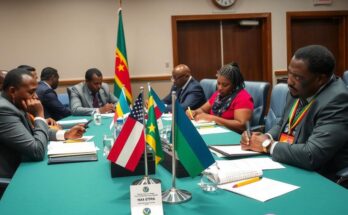This article addresses five misleading claims regarding the 2024 Pennsylvania election, clarifying issues such as slow result counts, voter disenfranchisement, voting machine integrity, fraudulent registrations, and noncitizen voting. It emphasizes the assured protocols for fair elections amid ongoing disinformation.
Since the 2020 presidential election, claims of election fraud and misinformation have surged, particularly in battleground states such as Pennsylvania. With the 2024 election approaching and former President Donald Trump back on the ballot, misconceptions surrounding voting processes are once again prevalent. This article addresses five common misleading assertions regarding the upcoming Pennsylvania election and clarifies the factual context surrounding them. 1. Do Slow Pennsylvania Results Indicate Problems? Despite past delays, slower result counts in Pennsylvania do not signal irregularities. Laws governing mail voting are inherently slower than in other states, particularly as the previous presidential election set precedents for new mail-in procedures. County officials assure that this election’s processes will be more streamlined due to improved logistics and updated technology, reducing potential delays significantly. 2. Were Early Voters in the Philadelphia Suburbs Disenfranchised? Confusion arose regarding long lines experienced by early voters in Bucks County. Pennsylvania lacks conventional early voting; however, voters can apply for and submit mail ballots as an alternative. Despite long lines on the deadline for mail ballot applications, voters retained the option to vote in person on Election Day if they were unable to apply in time. 3. Will Voting Machines Be Rigged? Concerns regarding miscalibrated voting machines have emerged, yet these instances do not imply fraud. The Pennsylvania voting system includes stringent vetting protocols and testing procedures to ensure machines function correctly. Moreover, thorough audits post-election verify that all votes are accurately counted. 4. Are Thousands of Fake Voter Registrations Being Accepted? Allegations of widespread fraudulent voter registrations in Pennsylvania are unfounded. The voting registration process mandates verification of identity and citizenship, including penalties for any violations. Election officials rigorously check registrations, assuring the integrity of voter eligibility. 5. Are Large Numbers of Noncitizens Voting in Pennsylvania? Claims regarding noncitizens voting are widely exaggerated. Such occurrences are illegal and extremely rare, with a minuscule number of reports confirming any unauthorized ballots cast. Pennsylvania has established safeguards to verify citizenship for all applicants. These assertions have fueled confusion and distrust in the electoral process. However, Pennsylvania officials emphasize their commitment to transparent and fair elections, reinforcing the established protocols designed to uphold electoral integrity.
The landscape of electoral processes in the United States has increasingly come under scrutiny since the controversial 2020 presidential election. Following that election, numerous conspiracy theories emerged, alleging widespread fraud, particularly in key swing states such as Pennsylvania. The 2024 elections are anticipated to reignite these challenges, particularly given former President Trump’s candidacy. Addressing disinformation related to election integrity is vital for maintaining public trust in democratic processes. This article aims to debunk prevalent misconceptions concerning the electoral framework in Pennsylvania, focusing on mail ballots, voting technology, voter registration, and noncitizen voting.
In summary, misleading claims about the 2024 election in Pennsylvania reflect a larger trend of disinformation affecting public perception of electoral integrity. Through clarifying the facts surrounding voting processes, including mail-in voting, ballot counting, and registration verification, state officials aim to uphold the system’s trustworthiness. As the election approaches, it remains crucial for both officials and citizens to engage in accurate discourse to preserve the sanctity of the electoral process in Pennsylvania.
Original Source: www.spotlightpa.org




